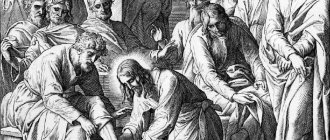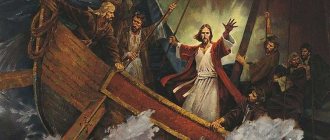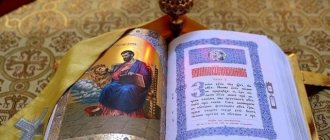GOSPEL OF JOHN chapter 3
Listen to THE GOSPEL OF JOHN chapter 3 online
1 Among the Pharisees there was a certain man named Nicodemus, one of the leaders of the Jews.
2 He came to Jesus at night and said to Him: Rabbi! we know that You are a teacher come from God; for no one can do such miracles as You do unless God is with him.
3 Jesus answered and said to him, “Truly, truly, I say to you, unless someone is born again, he cannot see the kingdom of God.”
Conversation of Jesus Christ with Nicodemus. Artist Y. S. von KAROLSFELD
4 Nicodemus said to Him, “How can a man be born when he is old?” Can he really enter his mother’s womb another time and be born?
5 Jesus answered, “Truly, truly, I say to you, unless one is born of water and the Spirit, he cannot enter the kingdom of God.”
6 That which is born of the flesh is flesh, and that which is born of the Spirit is spirit.
7 Do not be surprised at what I said to you: you must be born again.
8 The Spirit breathes where it wills, and you hear its voice, but you do not know where it comes from or where it goes: this is the case with everyone born of the Spirit.
9 Nicodemus answered and said to Him, “How can this be?”
10 Jesus answered and said to him, “You are the teacher of Israel, and do you not know this?”
11 Truly, truly, I say to you, we speak of what we know and testify of what we have seen, but you do not accept Our testimony.
12 If I told you about earthly things and you do not believe, how will you believe if I tell you about heavenly things?
13 No one has ascended into heaven except the Son of Man, who is in heaven, who came down from heaven.
14 And as Moses lifted up the serpent in the wilderness, so must the Son of Man be lifted up,
15 So that whoever believes in Him will not perish, but have eternal life.
16 For God so loved the world that he gave his only begotten Son, that whoever believes in him should not perish but have eternal life.
17 For God did not send His Son into the world to condemn the world, but that the world might be saved through Him.
18 He who believes in Him is not condemned, but he who does not believe is already condemned, because he has not believed in the name of the only begotten Son of God.
19 Now this is the judgment, that light has come into the world; but people loved darkness rather than light, because their deeds were evil;
20 For everyone who does evil hates the light and does not come to the light, lest his deeds be exposed, because they are evil.
21 But he who does righteousness comes to the light, so that his deeds may be made clear, because they are done in God.
22 After this Jesus came with His disciples to the land of Judea, and there he lived with them and baptized.
23 And John also baptized at Aenon, near Salem, because there was much water there; and they came there and were baptized,
24 For John was not yet imprisoned.
25 Then John's disciples had a dispute with the Jews about purification.
26 And they came to John and said to him: Rabbi! He who was with you at the Jordan and about whom you testified, behold He baptizes, and everyone comes to Him.
27 John answered and said, “A man cannot take upon himself anything unless it is given to him from heaven.”
28 You yourselves are my witnesses of this, that I said, I am not the Christ, but I was sent before Him.
29 He who has the bride is the groom, and the friend of the groom, standing and listening to him, rejoices with joy when he hears the voice of the groom. This joy of mine was fulfilled.
30 He must increase, but I must decrease.
31 He who comes from above is above all; but he who is from the earth is and speaks as he who is from the earth; He who comes from heaven is above all,
32 And what He saw and heard, He testifies; and no one accepts His testimony.
33 He who received His testimony has thus sealed that God is true,
34 For He whom God has sent speaks the words of God; For God does not give the Spirit by measure.
35 The Father loves the Son and has given all things into His hand.
36 He who believes in the Son has eternal life, but he who does not believe in the Son will not see life, but the wrath of God remains on him.
Share
Gospel of John, Chapter 3, verses 16-21
16 For God so loved the world that he gave his only begotten Son, that whoever believes in him should not perish but have eternal life.
17 For God did not send His Son into the world to condemn the world, but that the world might be saved through Him.
18 He who believes in Him is not condemned, but he who does not believe is already condemned, because he has not believed in the name of the only begotten Son of God.
19 Now this is the judgment, that light has come into the world; but people loved darkness rather than light, because their deeds were evil;
20 For everyone who does evil hates the light and does not come to the light, lest his deeds be exposed, because they are evil.
21 But he who does righteousness comes to the light, so that his deeds may be made clear, because they are done in God.
Archpriest Pavel Velikanov reads and comments on the Gospel of John, Chapter 3, verses 16-21
John, III, 16-21
16 For God so loved the world that he gave his only begotten Son, that whoever believes in him should not perish but have eternal life. 17 For God did not send His Son into the world to condemn the world, but that the world might be saved through Him. 18 He who believes in Him is not condemned, but he who does not believe is already condemned, because he has not believed in the name of the only begotten Son of God. 19 Now this is the judgment, that light has come into the world; but people loved darkness rather than light, because their deeds were evil; 20 For everyone who does evil hates the light and does not come to the light, lest his deeds be exposed, because they are evil. 21 But he who does righteousness comes to the light, so that his deeds may be revealed, because they are done in God.
Archpriest Pavel Velikanov comments
The theme of light and darkness is a running theme throughout the Gospel of John. In today's reading, which is very dense in meaning, this topic is intertwined with another - the topic of faith. He who believes in the Son is bright, he glows - however, not with some of his own, self-produced light, but with that very Light of Truth, on which the entire universe rests. A believer in Jesus is attuned to Him - and therefore can continue to transmit that pure, undistorted Light of Truth, the source of which is God Himself.
Evangelist John invites the reader to think about what is the Judgment of God? After all, a trial is a transition from uncertainty to certainty. And God enters this world - not with a punishing sword, not with a destroying punishment - but with an enlightening Light. However, for those who have long become accustomed to the darkness, this radiance of Light seems too sharp and unbearable: the light comes, and they close their eyes in horror, covering their eyes with their hands, because they are afraid of going blind. But why are they afraid? Don’t they know that this Light is cleansing, renewing, healing - and not at all destroying, burning through and bringing unbearable pain?
And here the Evangelist John offers us a thought that is amazing in its depth. The one who commits evil fears first of all his real self. After all, only that which has authenticity is brought to light. What is". It is impossible to bring into the light a “ghost”, or a “ghost”, or this or that “appearance”, because it immediately evaporates, disappears. But in twilight, in “under-illumination” - they exist perfectly, confusing people, convincing them of the reality of their presence. Obscurity, turbidity, understatement, variability of interpretations - all this is a nutritious broth for our “dark double”, “spiritual ghost”. He is an absolute parasite, he feeds only on the juices and forces of our human nature, which God gave us - but at the same time he tries to tear it away from involvement in God, to make it his own, autonomous, independent.
Each of us is familiar with this nightmare of egocentrism. We understand that this is impossible, wrong, sinful - but it envelops us from all sides, we try to break out of this sticky cocoon - but we become even more confused. We are upset, confused, intimidated. Our “ghost” turns out to be stronger than us.
Anyone who agrees with this situation eventually not only gets used to it, but even begins to experience a kind of pleasure. Haven't you noticed that in any fulfilled passion there is a special sweetness? It’s sweet when your enemy is much worse off than you. Joy when vengeance was finally accomplished. And how a money lover’s heart skips a beat when he sees another sum in his account - even if he doesn’t intend to use it! And how much viscous sweetness there is in despondency and sadness! Here our Ego simply unfolds in earnest!
All this is the “love of darkness” that the evangelist speaks of. It is impossible to love evil in its nakedness. But it masterfully covers up its empty insides with apparent goodness - and we succumb and are deceived again and again, ultimately experiencing the bitterness of disappointment. But we are so used to it that we cannot get out of this destructive game.
But when the Light of the Son of God comes into the soul, we have a real opportunity to be enlightened - to stop being afraid of our own ghosts and fears - and with all our might to rush to the One Who is the Light Himself, Whom no darkness can absorb!
Gospel reading with interpretation for December 3
Today, together with the Church, we will read an excerpt from the 10th chapter of the Gospel of John with the interpretation of Blessed Theophylact of Bulgaria.
I am the door: whoever enters through Me will be saved, and will go in and out and find pasture.
The thief comes only to steal, kill and destroy. I have come so that they may have life and have it more abundantly.
I am the good shepherd: the good shepherd lays down his life for the sheep.
But a hireling, not a shepherd, whose sheep are not his own, sees the wolf coming, and leaves the sheep and runs; and the wolf plunders the sheep and scatters them.
But the hireling flees because he is a hireling, and does not care about the sheep.
I am the good shepherd; and I know Mine, and Mine know Me.
As the Father knows Me, so I know the Father; and I lay down my life for the sheep.
I have other sheep which are not of this fold, and these I must bring: and they will hear My voice, and there will be one flock and one Shepherd.
John 10:9-16
Interpretation of the books of the New Testament - read the full version online for free (entire text)
on THE HOLY GOSPEL
in four books
GOSPEL OF MATTHEW
The divine men who lived before the law did not learn from scriptures and books, but, having a pure mind, were enlightened by the illumination of the All-Holy Spirit, and thus knew the will of God from the conversation of God Himself with them mouth to mouth. Such was Noah, Abraham, Isaac, Jacob, Job, Moses. But when people became corrupted and became unworthy of enlightenment and teaching from the Holy Spirit, then the man-loving God gave Scripture, so that, although with its help, they would remember the will of God. So Christ himself first personally talked with the apostles, and (after) sent them the grace of the Holy Spirit as teachers. But since the Lord foresaw that heresies would subsequently arise and our morals would deteriorate, He deigned that the Gospels should be written, so that we, having learned the truth from them, would not be carried away by heretical lies, and so that our morals would not completely deteriorate.
He gave us the four Gospels because we learn from them the four main virtues: courage, wisdom, truth and chastity: we learn courage when the Lord says:
Do not be afraid of those who kill the body but cannot kill the soul
(Matt. 10:28); wisdom when he says:
be wise as serpents
(Matt. 10, 16); truth when he teaches:
as you want people to do to you, so do to them
(Luke 6:31); chastity when he says:
whoever looks at a woman with lust has already committed adultery with her in his heart
(Matt. 5:28). He gave us the four Gospels also because they contain subjects of four kinds, namely: dogmas and commandments, threats and promises. They threaten those who believe in dogmas, but do not keep the commandments, with future punishments, and promise eternal benefits to those who keep them. The Gospel (good news) is called so because it tells us about good and joyful things for us, such as: remission of sins, justification, relocation to heaven, adoption to God, inheritance of eternal blessings and liberation from torment. It also proclaims that we receive these benefits easily, for we do not acquire them through our labors and do not receive them for our good deeds, but we are rewarded with them through the grace and love of God.
There are four evangelists: two of them, Matthew and John, were from among the twelve, and the other two, Mark and Luke, from among the seventy. Mark was Petrov's companion and student, and Luka Pavlov. Matthew was the first to write the Gospel in Hebrew for the believing Jews, eight years after the ascension of Christ. John, as rumor has it, translated it from Hebrew into Greek. Mark, on the instructions of Peter, wrote the Gospel ten years after the Ascension; Luke after fifteen years, and John after thirty-two years. They say that, after the death of the former Evangelists, the Gospels were presented to him, at his request, in order to examine them and say whether they were written correctly, and John, since he received the great grace of truth, supplemented what was omitted from them, and I wrote about what they spoke briefly about in more detail in my Gospel. He received the name Theologian because other Evangelists did not mention the eternal existence of God the Word, but he spoke about it in a divinely spiritual way, so that they would not think that the Word of God is just a man, that is, not God. Matthew speaks of the life of Christ only according to the flesh: for he wrote for the Jews, for whom it was enough to know that Christ was born of Abraham and David. For a Jewish believer will be at peace if he is assured that Christ is from David.







